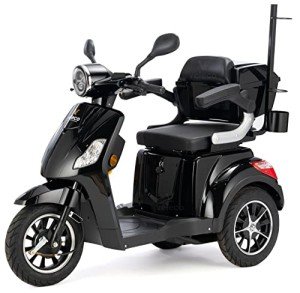Mobility Scooters: A Comprehensive Guide
Mobility scooters have ended up being a vital mode of transport for numerous people dealing with mobility difficulties. This article checks out the various aspects of mobility scooters, including their types, advantages, functions, and a guide for prospective buyers.
Understanding Mobility Scooters
Mobility scooters are electrically powered devices developed for individuals with limited mobility. They supply a means of transport for people who might have trouble strolling but still want to retain their independence. They come in various designs and functions to deal with a vast array of requirements.
Types of Mobility Scooters
Mobility scooters can normally be categorized into 3 primary types:
| Type | Description | Best For |
|---|---|---|
| Compact Scooters | These are small and lightweight, perfect for inside your home and short trips. | Users with minimal storage area or those who travel often. |
| Mid-size Scooters | A balance between portability and stability, appropriate for both indoor and outdoor usage. | Those who require to cover a variety of surfaces. |
| Heavy-duty Scooters | Large and robust, created for rugged outdoor use and much heavier individuals. | Users needing extra weight capacity or going off-road. |
Key Features of Mobility Scooters
The option of mobility scooter typically depends on the features that align with specific needs. Here are some of the essential features to consider:
- Weight Capacity: Mobility scooters come with different weight limitations. It is important to choose a scooter that can properly support the user's weight.
- Range: The distance a scooter can take a trip on a single charge differs. Depending upon user needs, one might go with scooters with a series of approximately 40 miles.
- Speed: Most mobility scooters can reach speeds in between 4 to 8 miles per hour. Consider what speed is comfortable and safe for the desired environment.
- Turning Radius: A compact turning radius is vital for indoor use, permitting much easier navigation in tight areas.
- Battery Type: The kind of batteries used can impact the scooter's efficiency. Lead- invalid scooters uk and lithium-ion batteries are the most typical.
Benefits of Using Mobility Scooters
The advantages of mobility scooters extend beyond just transport. Some key benefits include:
- Independence: Users can browse their environment without counting on caretakers, promoting independence and self-esteem.
- Health Benefits: Using a scooter can motivate outside activity, causing physical and psychological health enhancements by lowering feelings of isolation.
- Convenience: Scooters can easily be run in various environments, whether indoors, in mall, or outdoors.
Important Considerations When Buying a Mobility Scooter
When purchasing a mobility scooter, several considerations can assist guarantee that you choose the best design:
Assess Individual Needs:
- Mobility level: Consider just how much help the individual will need.
- Variety of use: Determine where the scooter will primarily be used (inside your home, outdoors, on rough surfaces, and so on).
Test Drive:
- Always test drive several designs to find an ideal fit. Take notice of comfort, ease of steering, and the scooter's responsiveness.
Evaluation Safety Features:
- Look for scooters with appropriate security features like lights, signs, and anti-tip styles.
Check Warranty and Service Options:
- A reputable warranty and available service choices are vital for long-lasting usage.
Frequently Asked Questions about Mobility Scooters
1. How quick do mobility scooters go?Mobility scooters usually have speeds ranging from 4 to 8 mph, with the majority of designed for safety instead of high-speed travel. 2. Exist weight limitations on mobility scooters?Yes, mobility
scooters come with particular weight limits, often ranging from
250 lbs to over 500 lbs, depending on the design. 3. Can mobility scooters be utilized indoors?Certain designs, especially compact scooters, are particularly created for
indoor use and are much easier to steer in tight spaces. 4. How often do the batteries need to be replaced?Battery life can differ based on use, however normally, with correct care, batteries may last between 1 to 3 years before requiring replacement
. 5. Are mobility scooters covered by insurance?Coverage can differ, but some insurance coverage plans, including Medicare and Medicaid, might cover part of the cost. It's advised to contact specific insurance companies. Mobility scooters serve as a
valuable tool for lots of people, allowing them to maintain
their liberty and independence. By understanding the various types and features of mobility scooters, people can make educated choices tailored to their specific requirements.
Whether utilized for errands, mingling, or leisurely activities, mobility scooters can boost the quality of life for those with mobility constraints. Purchasing a mobility scooter is a choice that can considerably affect a person's every day life. For that reason, people ought to carefully evaluate their alternatives and select a design that best aligns with their lifestyle and mobility requirements
.

